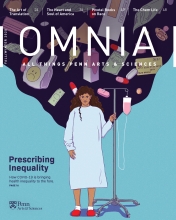Omnia 101: Human Cooperation
Coren Apicella, Associate Professor of Psychology, discusses how individual and social behavior evolves.

Omnia 101 offers readers a peek into what faculty do every day in their classrooms, and how they bring their expertise to the next generation.
Why do we hold doors for strangers and not expect a favor in return? Why do philanthropists make anonymous donations that will impact the lives of strangers? Coren Apicella, Associate Professor of Psychology, says that in order to understand these types of scenarios, we need to examine the different phases of humankind’s unique brand of cooperation.

Coren Apicella, Associate Professor of Psychology
“Imagine a 100,000-page volume dedicated to the history of Earth—humans would only make their appearance on the very last page,” says Apicella, who has lived among and studied the Hadza in Tanzania, one of the last hunter-gatherer populations in the world. “It would include a list of assaults that humanity has faced and overcome, and a spectacularly long list of unparalleled achievements and discoveries: the printing press, walking on the Moon, the internet, antibiotics, and more. But this story would not have been possible without cooperation. When we cooperate in the pursuit of shared goals, we can achieve remarkable things that no one individual could ever do on their own.”
Here, Apicella explains how human cooperation has evolved against the backdrop of an exponential rise in population growth and ever-changing social dynamics precipitated by variables like technology.
What is unique about human cooperation?
Compared to other animals, human cooperation is unique because we cooperate in a diverse range of situations and with a diverse range of individuals. Our cooperation extends beyond our relatives and beyond our friends to include strangers—people that we will never meet and people who will never pay us back. Of course, other animals cooperate, but among social mammals, cooperation tends to be limited to one’s relatives and long-term reciprocating partners. While reciprocity and shared genes can account for many forms of cooperation in nature, they’re inadequate for explaining these unique qualities of human cooperation—that humans help non-kin.
Are there theories about humans’ attitudes towards reciprocity?
Research shows that humans help others without any expectation for repayment. For a while, scholars evoked “mismatch” explanations to reconcile this human oddity. Mismatch explanations suggest that our psychology is adapted to what life was like for our ancestors, and, in particular, the long period of time that we lived as hunter-gatherers. Proponents of this idea suggest that our mind is adapted for living in small, stable groups of mostly relatives. But now we find ourselves interacting in much larger, more anonymous groups, a change that occurred very recently in evolutionary terms. Natural selection, they say, hasn’t had a chance to catch up. Hence the mismatch: we treat all our encounters as though they are kin or long-term reciprocating partners.
On the face of it, this mismatch explanation seems reasonable until you look at the data on hunter-gatherers. The data shows us that relatedness within hunter-gatherer groups is actually quite low. Individuals aren’t just living with their relatives. And furthermore, groups are not stable. What you find is that residence is remarkably fluid and groups are continuously being reconstituted with new members. These findings suggest that the mismatch explanation is inadequate for explaining our unique psychology for cooperation.
How does one investigate something as complex as the evolution of cooperation?
While there is very little support for the mismatch explanation, it is beneficial to try to understand the evolution of human cooperation in the context in which it evolved. For this reason, my own research is with a population of hunter-gatherers—one of the last such groups in existence. They’re called the Hadza and they’re from Tanzania, and their lifeway more closely approximates the life of our hunter-gatherer ancestors. In this way, the Hadza can teach us about the behavior of humans further back in time. I measured each individuals’ level of cooperation and I tracked their residence over a six-year period, documenting who they were living with. My goal was to test two additional explanations for the evolution of cooperation: norm transmission and partner choice.
How do the norm transmission and partner choice modes of cooperation differ?
Both solve the problem of cooperation in the same way: they lead to positive assortment, such that cooperators are interacting with other cooperators and thus not being taken advantage of by non-cooperators. In this way, cooperation becomes beneficial, rather than costly. With partner choice, cooperation is fixed within individuals and cooperators choose to live with other cooperators, excluding those who are uncooperative. However, with norm transmission cooperation is not fixed—it’s changeable within individuals. Instead, cooperation happens because cooperative (or selfish) behavior spreads within groups. It is very much like a game of dominoes. If I behave generously to you, you are more likely to behave generously to others.
What conclusions have you reached working with the Hadza?
Over a six-year period, I found that levels of cooperation were similar within each group of Hadza, but varied across the wider population. In other words, there was assortment. Importantly, I found that individuals’ level of cooperativeness changed as they moved from group to group. How cooperative a person was in one year did not predict how cooperative they would be in a future year. Instead, how cooperative someone is was best predicted by how cooperative their current group was. These results support the norm transmission model for the evolution of cooperation.
How have developments in technology continued to alter ideas of cooperation?
Cooperation allows us to do things and solve problems that no one individual could do on their own. However, the utility of our cooperative relationships increases dramatically when you factor in our capacity to learn from one another. In this way, recent technological developments make cooperation much more powerful because we now have a larger and more diverse pool of humans to cooperative with. We can now very efficiently connect with greater numbers of people from all around the world to share information, ideas, tools, and innovations at an unprecedented pace.
For example, scientific research in response to COVID-19 took off. Not only can scientists more readily communicate with each other, but they can share data, protocols, genome sequences and so on, much more easily with online repositories and archives. Even just 10 years ago this type of exchange was not possible. Technology is there to assist us. The harder part is getting people to cooperate.



